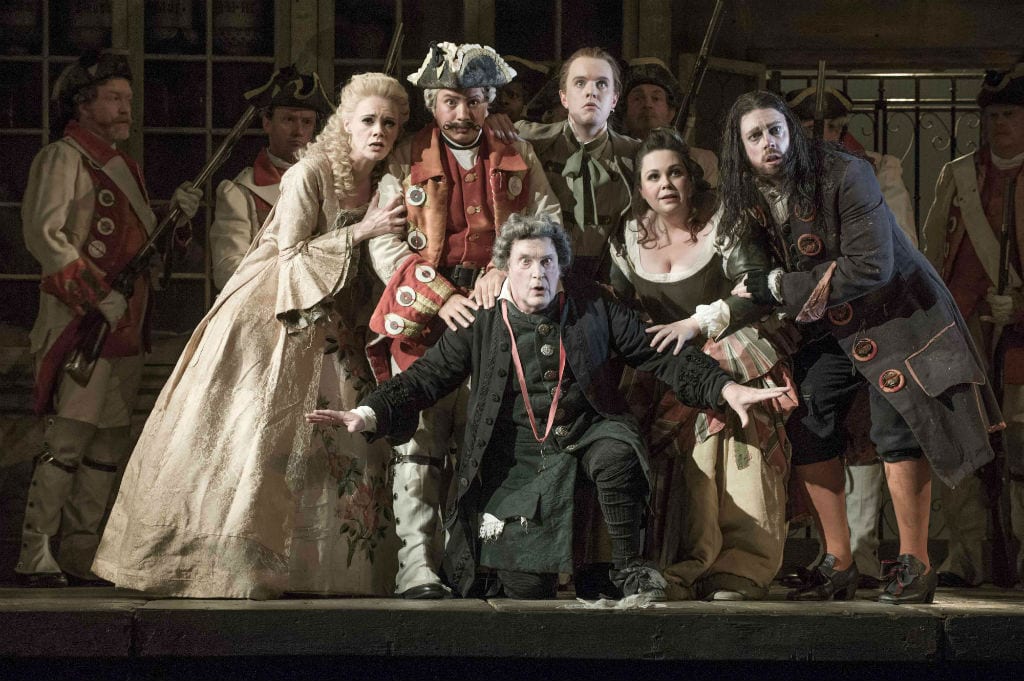Jonathan Miller’s production of Rossini’s The Barber of Seville is a perfect example of a concept that weathers well and the ability to look at a classic freshly while keeping to its period and character. It is now at least thirty years since Miller first created this production and though I have seen it revived with somewhat more verve, it is still remarkably resilient, ebullient and worth a visit.
I had the bright idea of taking a friend of mine who has never seen the opera at all before and she was totally entranced from beginning to end. She particularly liked Miller’s setting of the piece firmly in the comedia dell’arte tradition from which it actually does come; and she fell in love with all the characters. She was also, of course, also fascinated to see the prequel to The Marriage of Figaro, which she does know well. She saw the whole thing afresh and felt that the production by Miller really served the opera well.
One of the major things to remember about the opera, of course, is that it is based on a play that was, in its day, considered to be somewhat subversive. Whatever the minor edits of the Beaumarchais text for his libretto, Rossini’s opera and this production are remarkably true to the spirit of the original play and you can approach the work through this operatic setting for its historic significance if you wish. You can also of course seek out the version by Paisiello that it superseded controversially when Rossini first wrote the opera.
This revival is interestingly conducted by Hilary Griffiths, making an ENO debut I think, who takes some deliberate speeds that I found allowed me to savour details in the orchestra and to hear the orchestrations with great clarity. The performers are all very good indeed at their roles. For me Morgan Pearse as Figaro stood out, as he must. He caught the cheekiness and also the seriousness of the character and was already clearly some way towards being a man who would question the supposed superiority of the Count and the hierarchies of his society. Pearse has both a deeply pleasing voice and stage personality. He is an attractive, energetic and convincing Figaro. It would be a pleasure to see him in The Marriage of Figaro too. His cheeky chappy persona never overwhelmed a sense of the intelligence and seriousness of the character; and his duet with Rosina in the second scene was a superb example of the comedy inherent in the characters. I also enjoyed Sarah Tynan very much as Rosina. She was perky, she was mischievous; she was genuinely upset and hurt when she thought she was betrayed; and she has a lovely voice for the part. Eleazar Rodriguez also has a lovely voice and was particularly good at the comedy of personae in disguise. Add a strong and somewhat mincing Dr Bartolo by Alan Opie; a very comic and lugubrious Don Basilio by Alastair Miles; and a memorable Berta by Yvonne Howard whose inestimable contributions to the ensembles and whose solo aria were so strikingly strong and memorable that she made me wish her character was more central and had even more to do. The men of the chorus, both as commedia dell’arte gentlemen and as the soldiers, made a significant contribution to the proceedings and the whole thing worked a treat in its quite fine setting. And must also mention Matthew Durkan as a charming Fiorello with a lovely voice.
This revival is a good example of how to let a piece rest in the period of its conception and not be unnecessarily updating it while still tweaking it with references and action that have a totally contemporary appeal.
All in all, a very fine evening. Who knows how much longer this production will remain in the repertoire of the ENO? Catch it while you can in this pleasing revival!

